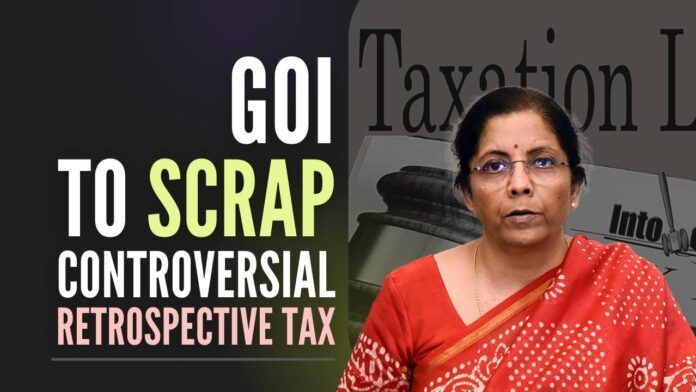
Retrospective Tax – Centre to scrap 9-year-old controversial tax law
After setbacks in Cairn and Vodafone cases, the Government on Thursday introduced a new tax amendment bill in Lok Sabha to scrap the nine-year-old controversial Retrospective taxation. Finance Minister Nirmala Sitharaman introduced ‘The Taxation Laws (Amendment) Bill, 2021’ in the Lok Sabha that seeks to withdraw tax demands made using a 2012 retrospective legislation to tax the indirect transfer of Indian assets. The Bill also said that the money will be refunded in these cases without any interest.
The new Tax bill provides for the withdrawal of tax demand made on “indirect transfer of Indian assets” if the transaction was undertaken before May 28, 2012, the day the retrospective tax legislation came into force. “It is also proposed to refund the amount paid in these cases without any interest thereon,” it said. The bill has a direct bearing on long-running tax disputes with British firms Cairn Energy Plc and Vodafone Group. India has lost two separate arbitrations brought by the two companies against the levy of retrospective taxes in international arbitrations forums.
The Bill proposes to amend the Income-tax Act, 1961 so as to provide that no tax demand shall be raised in the future on the basis of the said Retrospective amendment for any indirect transfer of Indian assets.
While the Government has virtually no liability in the Vodafone case, it has to refund USD 1.2 billion to Cairn Energy for the shares of the company it had sold, tax refund withheld, and dividends confiscated. The bill states that the issue of taxability of gains arising from the transfer of assets located in India through the transfer of shares of a foreign company (indirect transfer of Indian assets) was a subject matter of protracted litigation.
The Supreme Court in 2012 had given a verdict that gains arising from indirect transfer of Indian assets are not taxable under the extant provisions of the Act. But to circumvent this, the provisions of the Income Tax Act, 1961 were amended by the Finance Act, 2012 with retrospective effect, to clarify that gains arising from the sale of shares of a foreign company are taxable in India if such shares, directly or indirectly, derive their value substantially from assets located in India.
“Pursuant thereto, income-tax demand had been raised in 17 cases. In two cases assessments are pending due to stay granted by High Court,” the objects of the Bill said. Out of the 17 cases, arbitration under Bilateral Investment Protection Treaty with the United Kingdom and the Netherlands had been invoked in four cases. “In two cases, the Arbitration Tribunal ruled in favour of the taxpayer and against the Income Tax Department,” it said in a reference to arbitration awards won by Cairn and Vodafone.
“The said clarificatory amendments made by the Finance Act, 2012 invited criticism from stakeholders mainly with respect to the retrospective effect given to the amendments. It is argued that such retrospective amendments militate against the principle of tax certainty and damage India’s reputation as an attractive destination,” said the new Bill.
While the government has in the past few years brought major reforms in the financial and infrastructure sector to create a positive environment for investment in the country, “the retrospective clarificatory amendment and consequent demand created in a few cases continue to be a sore point with potential investors,” it said.
“The Bill proposes to amend the Income-tax Act, 1961 so as to provide that no tax demand shall be raised in the future on the basis of the said retrospective amendment for any indirect transfer of Indian assets if the transaction was undertaken before 28th May 2012 (i. e., the date on which the Finance Bill, 2012 received the assent of the President),” said the new Bill.
It further proposed to provide that the demand raised for indirect transfer of Indian assets made before May 28, 2012, shall be nullified on fulfillment of specified conditions such as withdrawal or furnishing of undertaking for withdrawal of pending litigation and furnishing of an undertaking to the effect that no claim for cost, damages, interest, etc. shall be filed.
The bill proposes to amend the Finance Act, 2012 so as to provide that the validation of demand under section 119 of the Finance Act, 2012 shall cease to apply on fulfillment of specified conditions such as withdrawal of pending litigation and furnishing of an undertaking that no claim for cost, damages, interest, etc shall be filed.
- Subramanian Swamy approaches Supreme Court on Govt’s modification of 2G Scam Judgment to avoid auction of Satellite Spectrum - April 23, 2024
- Defence Minister Rajnath Singh visits Siachen. Reviews military preparedness - April 22, 2024
- Amit Shah’s shares in the Stock Market almost doubled in the past five years - April 21, 2024










